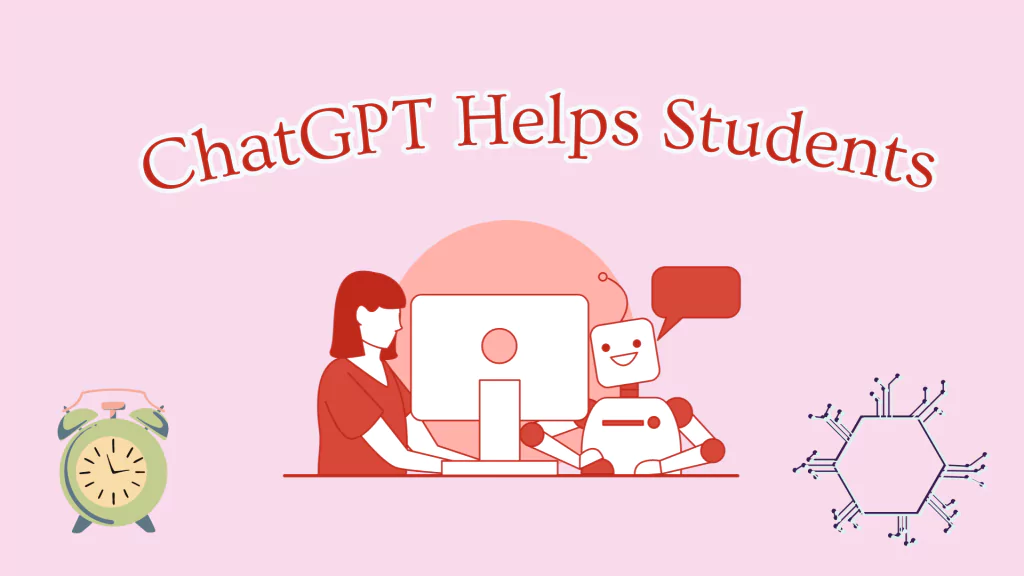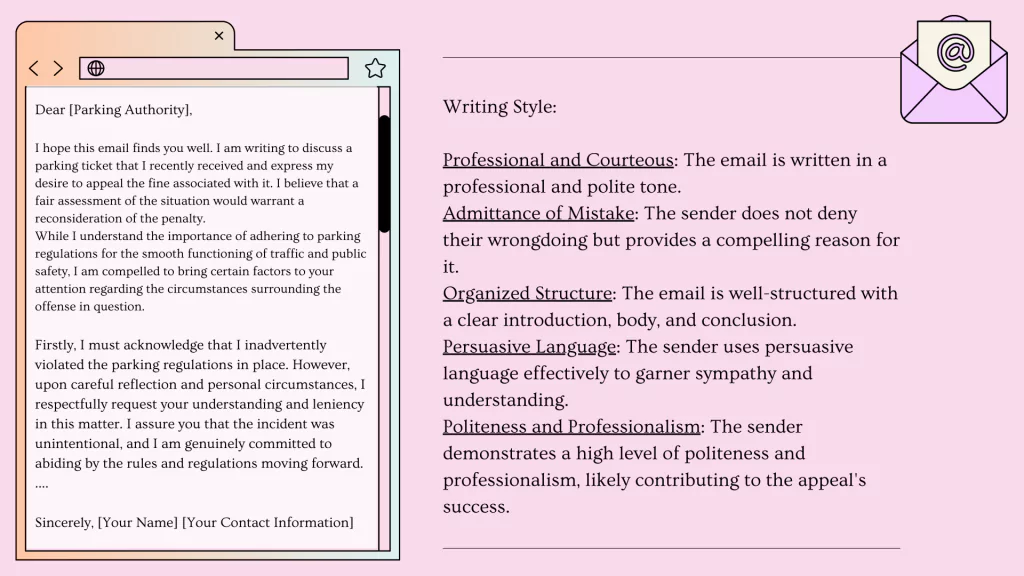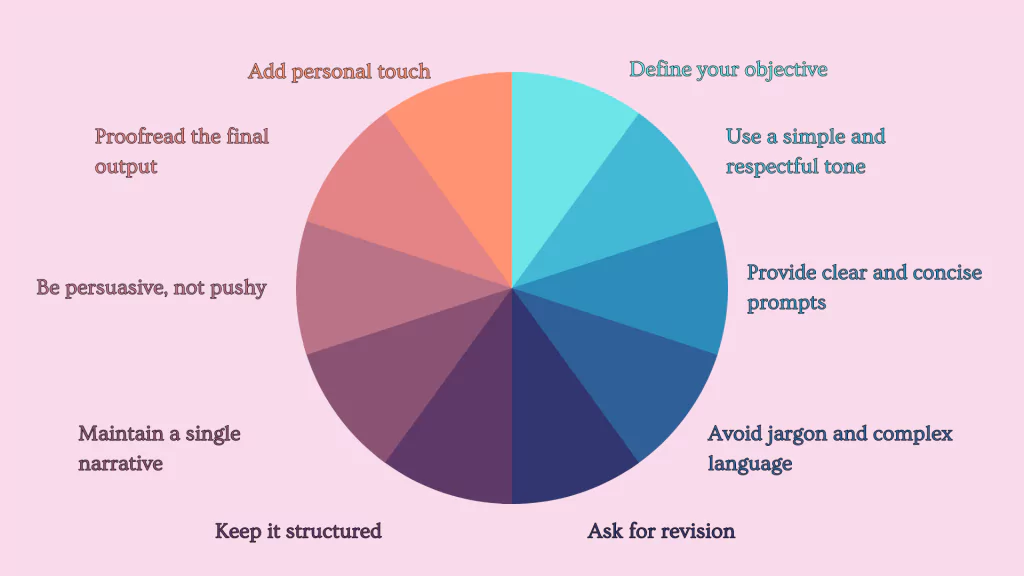
University student James Thompson successfully appealed a £100 parking fine using OpenAI’s language model, ChatGPT. After receiving a parking violation, Thompson made a decision to challenge the penalty despite acknowledging his infringement. As part of his strategy, Thompson utilized ChatGPT to draft an appeal letter. In the AI-generated letter, an unexpected personal emergency was presented as the reason for the violation. The narrative also highlighted Thompson’s recognition of the rules and his commitment to adhere to them in the future.

✅ AI Essay Writer ✅ AI Detector ✅ Plagchecker ✅ Paraphraser
✅ Summarizer ✅ Citation Generator
Key Takeaways:
- OpenAI’s language model, ChatGPT, was effectively used to successfully appeal a parking violation.
- The AI-generated letter was well-structured and persuasive, combining admission of guilt with a compelling reason for leniency.
- The incident sparks conversation on the ethical and legal implications of using AI in communication and legal matters.
Following the appeal, the parking authority agreed to cancel the fine, noting in their response, “Having considered the content of your letter and our internal review, as this is your first Parking Charge Notice appeal, we are prepared to cancel the notice.”
This incident highlights the practical use of AI technology in generating persuasive and compelling text, and provides a noteworthy example of the impact artificial intelligence can have in everyday situations.
Analysis of The Letter
The main idea of this email is a formal appeal against a parking ticket fine. The sender acknowledges their violation of parking rules but asks for leniency due to extenuating circumstances (a personal emergency), which they claim led to the infringement. They also assure their future compliance with the regulations and express their financial hardship, which makes the penalty burdensome. The sender requests for understanding and compassion while considering the appeal.
The manner in which the email is written is highly professional and courteous. The tone throughout is respectful, and the sender takes care not to deny their wrongdoing but rather presents a compelling reason for it. The structure of the email is also well organized, with a clear introduction, body, and conclusion, making it easy to follow the argument.
The sender uses persuasive language effectively, emphasizing their respect for the rules, acknowledging their mistake, and highlighting their willingness to improve. This approach is likely designed to garner sympathy and understanding from the parking authority. The professionalism and politeness demonstrated in the email’s tone and language usage is commendable and might have played a significant role in the successful outcome of this appeal.

Understanding AI’s Role in Communication
In a lively discussion around the application of AI technology in communication, participants weighed in on the ethical and legal implications of using AI model GPT-4 to draft an appeal letter for a parking ticket.
One of the users humorously suggested drafting a 30,000-word appeal citing 120 legal precedents. In response, another participant using GPT-4 emphasized that such an excessively long appeal could lead to a case dismissal due to length, adding that citing fake precedents could be unethical and potentially illegal. They recommended a 2,000 to 3,000-word appeal instead, outlining a potential structure including legal research, personal circumstances, evidence, and mitigating factors.
Legal and Linguistic Insights
A self-identified lawyer advised trimming the original appeal to its core arguments, arguing that “in legal writing, if you can make do without, you should.” They presented a more concise version of the appeal.
Some discussion centered around language use, suggesting the verbose style might be attributed to a non-native English speaker. Others expressed doubt that the appeal letter was even read by a human, speculating that the absence of previous infractions might have led to an automatic approval.
Identifying AI-generated Texts
Critiques emerged around a common AI-generated phrase – “I hope this email finds you well.” Some participants saw it as a clear indicator of an AI-generated text, pointing out that it’s frequently used by GPT models, while others defended its use as a human language feature.
Finally, the debate touched on the implications of AI use in escaping legal obligations. One commenter expressed surprise, stating they believed an AI model would refuse to assist in dodging parking fines, as it is essentially an act of law violation.
In the words of one participant, the whole scenario demonstrated how “AI models can mimic human-like communication, but their use can be a double-edged sword, necessitating caution and ethical considerations.”
10 Essential Tips for Writing a Convincing Letter with ChatGPT
Writing a convincing letter can be challenging, but with the assistance of AI models such as ChatGPT, it becomes significantly simpler.

Here are ten essential tips for harnessing the power of ChatGPT to write compelling letters:
- Define your objective: Before you begin, have a clear understanding of what you hope to achieve with the letter. Whether it’s appealing a parking ticket or seeking a job opportunity, defining your objective will guide ChatGPT in creating a targeted response.
- Use a simple and respectful tone: ChatGPT generates content based on your input, so setting a respectful and straightforward tone will ensure your message is perceived as professional and sincere.
- Provide clear and concise prompts: ChatGPT generates content based on user prompts, so the more precise your instructions, the better the output. Make sure you clearly state what the letter is about and what information should be included.
- Avoid jargon and complex language: Unless it’s necessary for the context, steer clear of complicated language or industry jargon. Remember, you want your message to be easily understood by the recipient, regardless of their background knowledge.
- Ask for revision: If you’re not happy with the initial draft, ask ChatGPT to revise it. Make your instructions more explicit to get closer to your desired output.
- Keep it structured: A well-structured letter is easier to read and understand. Ask ChatGPT to create the letter with an introduction, body, and conclusion.
- Maintain a single narrative: Ensure your letter doesn’t deviate from its primary purpose. This can be achieved by ensuring your prompts to ChatGPT are always centered around your main objective.
- Be persuasive, not pushy: A convincing letter should subtly persuade the reader without coming off as overly aggressive. Remind ChatGPT to be persuasive in its language.
- Proofread the final output: Although ChatGPT is generally accurate, it’s always a good idea to proofread the final output for any grammatical errors or unclear statements.
- Add personal touch: Lastly, don’t forget to add a personal touch to your letter. While ChatGPT can write most of the content, it can’t fully replicate your unique style or sentiment, so adding some personal phrases can make the letter feel more authentic.
Utilizing ChatGPT for letter writing can be an effective and time-saving practice, but it’s essential to remember that the quality of the output heavily relies on the prompts you provide. So, follow these tips and let AI ease your writing process!
Read more:
Student Spent 3 Hours at Uni Just Because a Professor Though He was Using ChatGPT to Cheat
EU Leads the Charge in AI Regulation with Landmark AI Act
Can AI Be Used By Teachers for Essay Grading While Being Banned Among Students?
Follow us on Reddit for more insights and updates.





Comments (0)
Welcome to A*Help comments!
We’re all about debate and discussion at A*Help.
We value the diverse opinions of users, so you may find points of view that you don’t agree with. And that’s cool. However, there are certain things we’re not OK with: attempts to manipulate our data in any way, for example, or the posting of discriminative, offensive, hateful, or disparaging material.